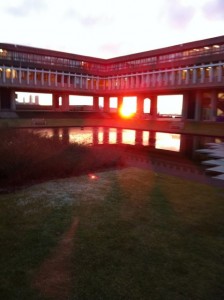Posts Tagged ‘learning’
Who Will Fight For Public Education?
On December 6, Peter Fassbender, the provincial Minister of Education, spoke at the BC School Trustees Association (BCSTA) Academy. It was the first time I had heard him in-person and I found his presentation to be coercive, if not threatening. His central argument seemed to be that in these uncertain economic times Boards of Education must make hard decisions or else face the consequences. I’m still trying to decipher his meaning.
Afterwards, in one of those characteristic quick chats you have at events such as these, another Trustee said to me she felt Minister Fassbender sounded more like the Minister for Small Business and Trade than the Minister of Education. Then she said this: “If you can’t count on the Minister of Education, then who can you count on? Who will fight for public education?”
Why?
Because although there are many passionate advocates who fight for the public education system, decision-making power rests at the table in front of cabinet Ministers and the Premier. And while they may believe in the importance of education, they seem to disavow any notion that the public education system is underfunded or that we have reached a point where school districts are unable to cover additional costs without directly affecting programs and services.
With that in mind, here’s the speech I wish the Minister had delivered to the assembly after Teresa Rezansoff, the President of BCSTA, had welcomed him to the podium and after he had acknowledged our presence on traditional territories.
“Good afternoon and thank you for inviting me to share my thoughts with you today.
When Rod Allen makes his presentation on changes to the BC curriculum, he may tell you that many young people lose their first job because they aren’t able to collaborate well with others. You also know that when we talk about 21st century learning we often focus on collaboration as one of the key skills we want our young people to develop. And you know, as well as I do, that we need to model the skills we want to teach. So, as Minister of Education, I plan to do just that. Over the next four years, I’ll do my very best to ensure that the governance of the public education system in BC is pursued on a collaborative basis.
That’s why I want to start off by thanking you. I want to thank each and every Board for funding the recent wage settlement with support staff. Not only is it incumbent upon us to recognize their hard work with gratitude, it’s important to be able to compensate their efforts with fair wage increases. But I know it was tough to make the necessary adjustments to your budgets and your operational plans and I’m sorry that we weren’t able to provide you with additional resources to cover this cost item. That’s why I want you to know that the next settlement, the one we hope to arrive at with the BCTF in this round of bargaining, will be fully funded. It will be fully funded because I know it would be unreasonable to expect the costs to come out of your budgets as they are currently structured.
With regard to the BCTF, let me say how pleased I am at the tenor of dialogue we’ve been able to establish with Jim Iker and his team at the BCTF since my appointment as Minister of Education. Our relationship is off to a good start and I look forward to continuing to build on that strength. But bargaining is tough. It’s not easy. But let me assure you that while our goal in bargaining is to secure a long-term contract, we also are focused on providing a fair deal. We want a long-term solution to ensure labour peace for students and their families, and to allow the amazing educators we have in this province to focus on the new curriculum, the changes in graduation requirements we hope to introduce, and the new approaches to assessment which will enhance student learning. In other words, we want to make sure that the energies of our educators are directed to the work that they do and not the need to fight with us. That’s collaboration. The end result may be a 10-year deal; it may be something else. We won’t let go of our desire for a long-term solution, but we want our partners to know that our public commitment to a particular time frame will not trump our willingness to bargain in good faith and to secure a fair settlement.
Allow me to make another quick note about bargaining. We will be bringing down legislation in February which will detail a new bargaining structure for the public education sector. The input you’ve provided with regard to what that may look like is very much appreciated. And let me say this: whatever that new structure will look like, it will not, in anyway, compromise the role and status of locally elected school boards. Having locally elected school boards means that local issues can be dealt with in a way that is sensitive to the needs and the wants of each individual community. That makes all the difference to the way public education is delivered at the local level and that’s a point that I’ll be stressing during the core review process as well.
As you know, my cabinet colleague Bill Bennett is in charge of the core review and he is also the Minister of Energy and Mines. Bill has said publicly that there will be no consideration for school districts when it comes to the recently announced BC Hydro rate increases. I realize that increases of this magnitude have become necessary because of decisions made by previous governments and the way in which the government’s relationship with BC Hydro has been structured. We’re working on that, but I want you to know that I plan to sit down with Bill as soon as possible and to push hard to see if there isn’t something we can do to mitigate the impact on you. I need to do that because I know, as well as you do, that any additional costs to your districts without additional funding means an impact on programs and services. And that’s not what we want.
It’s not what we want because even though your resources are stretched to the limit, you’ve done a fine job of making sure our young people are getting the education they need in order to be competitive. You can see that in the OECD PISA results released this week. Isn’t it great how well our young British Columbians are doing compared to other students from around the world? Together, we’ve done a wonderful job and we have to continue to build from this position of strength. We cannot afford to be complacent; we cannot afford to neglect the system that has served us well and which is essential to the continued success of our young men and women.
And that’s why I want you to know that I am sensitive to your challenges. I have read your letters, I have listened to you, and I have heard you. Funding is one of the key challenges facing our public education system because even though we may be spending more than ever before, costs have outpaced the level of funding provided. That won’t do. That’s just not good enough.
That’s why I want you to know that at the cabinet table I am demanding more for education. Yes, I know times are uncertain. Yes, I know the budget is stretched. But I will make it clear to the Premier that if we continue to demand the best from our public education system, we must ensure that the public education system has the means by which to be the best.
Because, like you, I believe that a strong, vibrant public education system is integral to our democratic society. We need jobs, we need a robust economy, but we also need to make sure our society is well-educated so we can maximize the potential of those jobs and that economy for all British Columbians.
Who will fight for public education? I will and you will and this government will because education is a priority — for you, for me, for the children, for all of us, and for the future.
Thank you.”
Time May Not Care But I Do
December looms. The last month of the year. I can only wonder how it is that 2013 has just over four weeks to go.
The months have flown by, the year has evaporated. Like the contrails of planes which soar overhead, all that’s left are lingering impressions of passing through space and time. I know I started there and I know I’ve ended up here, but I’ve lost the texture of the days and won’t remember all the details of my experiences along the way.
Time’s not going to hesitate in its relentless march to give me back the days or weeks or minutes or seconds I wasn’t able to enjoy or forgot to savour.
Time doesn’t care, but I do.
Why?
 Because the end of the year means the end of the semester at Simon Fraser University (SFU) and while time may not care that it’s left me breathless with its bruising speed, I do care about having to say goodbye to the students I’ve been working with since the first week in September.
Because the end of the year means the end of the semester at Simon Fraser University (SFU) and while time may not care that it’s left me breathless with its bruising speed, I do care about having to say goodbye to the students I’ve been working with since the first week in September.
There are any number of reasons for me to be ecstatic. Once exams are over and grading is done, I won’t have to contend with the agony of marking. Once the last book has been read and the last office hour held, I may be able to reintroduce balance in my day to day activities. Once the demands have lessened, I might be able to capitalize on a few extra hours of sleep.
I have many reasons to celebrate. But here’s the thing. All of those reasons and more are trumped by this one truth: I treasure working with undergraduates even if they hand in papers late, even if they won’t contribute to a class discussion, even if they haven’t done the reading, even if their writing skills are still in development, and even if they don’t care as much about the course as I do.
Based on concentrated interactions over 12 to 13 weeks, even if it’s just for 50 minutes each week, a connection is established although not with every student and not always successfully. A rapport grows among the members of each tutorial group, a sense of common purpose.
And for me the most rewarding moments are those times during a tutorial session when I can actually see the students thinking. When it seems like they are puzzling over a new idea, a new concept. Of course, they may just be squinting at the clock in anticipation of being released from the torture of sitting in yet another classroom with yet another TA droning on about something or the other. Maybe. But more often than not, I feel they’re giving serious consideration to the material at hand. They are learning and their horizons are expanding.
My time with these students is rapidly coming to an end and I’m incredibly appreciative of the time I’ve been privileged to spend in their company.
It may be brief, it may be over all too soon, but it’s time well-spent.
The Value of a Shock
In June 2013, a Grade 8 teacher invited me to participate in an event she had organized for her English class.
I accepted, with no qualms, to be a talking book. That is, an individual with whom students could converse. A living book providing real-time dialogue.
On the day of the event, each living book was guided to a different spot in the Rockridge library. The students, in small groups of five or six, rotated from one station to the next on a timed basis. They had spent time preparing for their roles as interviewers and the evidence of how much time their teacher had spent helping them get ready was clear.
Many of the questions they asked me focused on education.
“Is high school the best years of our lives?” One of my favourite questions, to which I answered, “No.” In my view, I explained, high school may be a pinnacle of experience for some, but it was not necessarily so for all. It hadn’t been for me.
One young woman asked for my advice on how best to prepare for university. I didn’t mind this question the first time it was asked, but by the second or third time it was broached, I’d had enough. I suggested that since they were only in Grade 8 they may be better served by focusing on what they had to do now. They had time to agonize over the rest.
There was one question which resonated with me the most. I remember it as “what do you think is the purpose of education?” but in her thank you letter the young woman who’d posed the question wrote it down as “what makes you so passionate about education?” The exact form of the question doesn’t matter because it was her interpretation which has made this into a cherished memory.
“Your answer shocked me. It was not an answer that I expected. You are not passionate about education because you think it makes people smart for a better job in the future, that was what I expected. Instead, you said that education makes us better people. … This is a moral that I will carry with me for my upcoming school years.”
And I do; I believe that education is about making each of us better.
That’s why the chorus for choice in the public education system sometimes rings false. Because those who sing that chorus the loudest are trying to draw a straight line from their children’s education, even as far back as kindergarten and earlier, to success in their lives as adults. There are connections and correlations between the two, but I believe we do a disservice to our young people when we present life as a simple equation of “if you do this, then you will get, or you will be, this”.
Life is complex and nuanced.
Life doesn’t always unroll in a straight line.
And that can be a shock.
And in the face of a shock like that, sometimes all we have to rely on is being the best person we can be.
The Impossibility of Knowing What Is To Be
Here’s the thing: none of us has a crystal ball. Not the pundits nor the prognosticators, some of whom have made very lucrative careers out of saying what they “know” will happen.
In fact, some say the events which shape the human experience are not the outcomes we forecast, but the unexpected occurrences to which we respond. For more on this, read The Black Swan: The Impact of the Highly Improbable by Nassim Nicholas Taleb.
I know I can’t speak to the future with certainty, but as I look towards the fall, I suspect my voice will be a dissenting one.
Why?
Because events are moving quickly in the public education sector with no clear indication of the government’s ultimate objective and yet there seems to be a general complacency about it all.
Here are three red-flag issues for me:
- The removal of the BCPSEA Board points to a profound change in the way bargaining will be conducted in the public education sector. I think BCPSEA paid the price for pursuing a path contrary to the provincial government’s vision. The board’s removal was sudden, swift, and seemingly–and mistakenly in my opinion–unlamented. Whether this is an improvement or not remains to be seen, but I am still looking for assurance that this is not the first step in a series of unilaterally determined shifts which may or may not prove to be publicly beneficial.
- A 10-year labour agreement with the BCTF is seductive and such an easy sell in the court of public opinion. But I’m not convinced, unless the deal is fully funded and increases resources significantly for students, that it can be accomplished in a fair and equitable manner. I am also not convinced that it is in the best interest of the employer as I’ve written about before here.
- Publicly elected school boards make a difference because they represent local interests and are accountable to local communities. The fact that we have a high-performing system today is due in large measure to the way districts (everyone from students to parents to trustees to staff to principals to teachers to support staff) have been able to keep the machine humming despite inadequate funding. Yes, the provincial government spends more per student now than ever before, but add up the costs that have been downloaded without being funded and the increases in expenses which haven’t been covered (including key items such as utility costs, MSP premiums, and carbon offsets) and you’ll see why there’s such a discrepancy. Yes, some boards have run into difficulties, and yes improvements can be made, but the attempt to disregard the government’s role in exacerbating the situation is disingenuous.
So while I may not be able to speak to what the future is bound to bring, I do know that I will continue to speak up and to advocate, even if I’m in the minority, because it doesn’t take a crystal ball to see that a healthy, thriving public education system is the best foundation for all our tomorrows.
A Question of Size
“We may not be big but we’re small!”
As CBC radio listeners know, that’s the motto of the Vinyl Café, the vinyl record store at the heart of Stuart McLean’s storytelling series.
I think the motto counterbalances another common theme of our times: “Bigger is Better”. A concept which often leads to trouble economically, politically, and environmentally.
The Vinyl Café motto is also a good fit for Lions Bay Community School, a primary school in School District 45 which enrolls approximately 60 students per year in kindergarten to Grade 3. A privately run preschool also operates on the premises.
In June, I attended the school’s leave-taking ceremony for its Grade 3s, a ceremony which marks their “graduation” and acknowledges their future status as intermediate students at other schools starting in September.
Lions Bay, it seems to me, is so big in what it does even though it is small.
Why?
Part of it is the setting. Nestled in the forest, the school seems to be swimming in an ocean of green.
Part of it is the architecture. Now over 30 years old, the school is built on an open-concept plan which allows an unparalleled flow between learning spaces and allows the teaching staff an exceptional amount of flexibility.
Part of it is the community. Families who choose to live in Lions Bay have made a specific lifestyle choice and they are active participants in the school because it is a major focus for the community.
There are challenges, too. Because it is so highly dependent on area demographics, enrollment at the school can only be maintained as long as there are young families in the area or willing longer-distance commuters (for example, if Squamish families or Horseshoe Bay residents were to choose the school for their children).
In addition to the excellent teaching staff, the supportive community, and the outstanding physical environment, size is something else that gives Lions Bay an edge. Being small helps the school fulfill its mission statement “to provide a safe learning environment and strive to enable students to become confident learners”.
The size of the school, in my opinion, keeps the student experience at the heart of operations by allowing a higher degree of personal attention. It has also sparked innovation in pedagogical approaches.
These factors have all combined to ensure success for these young students.
Being small can be effective.
Which brings me to the measures being taken to restructure the bargaining framework in BC’s public education system. Measures which I hope are not a prelude to regionalizing or eliminating Boards of Education.
As John Abbott, President of the 21st Century Learning Initiative, cautioned during a visit to West Vancouver earlier this year, losing local governance puts the future of learners at risk by distancing the local community from decision-making.
So here’s what I hope our provincial government and the leadership of BCSTA remember as they work together during the remaining days of summer.
Bigger is not always better.
Artwork by Lions Bay students on display in the gym.



